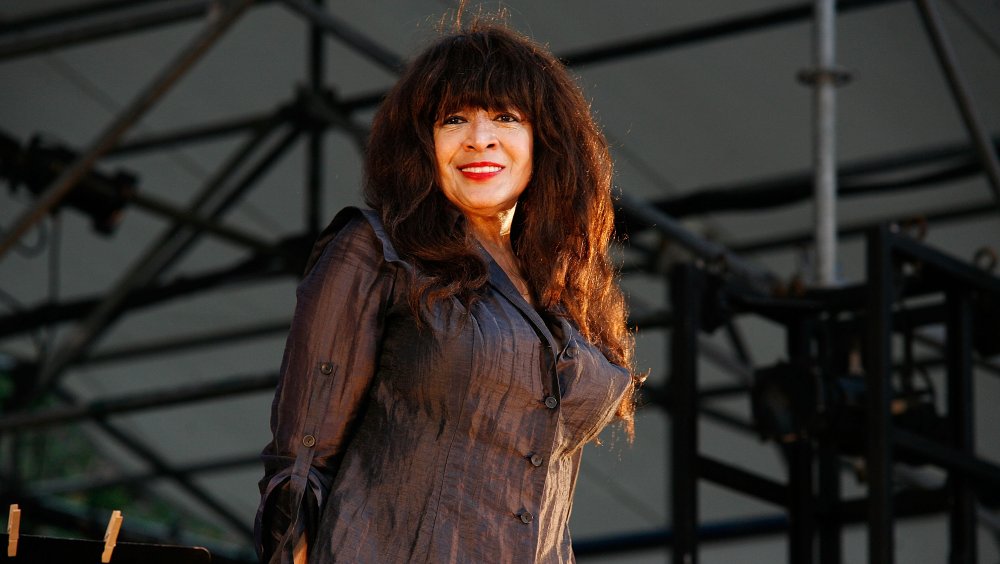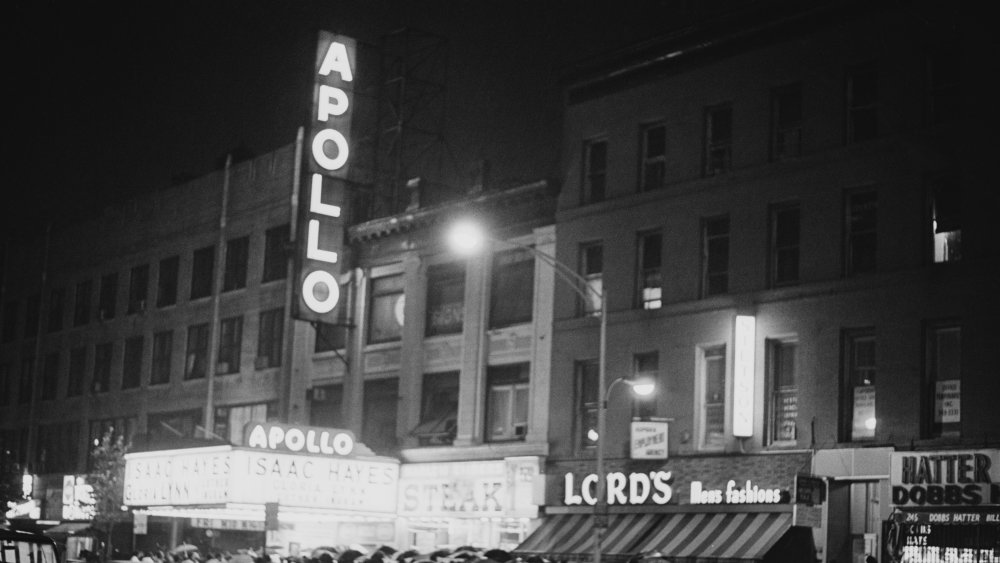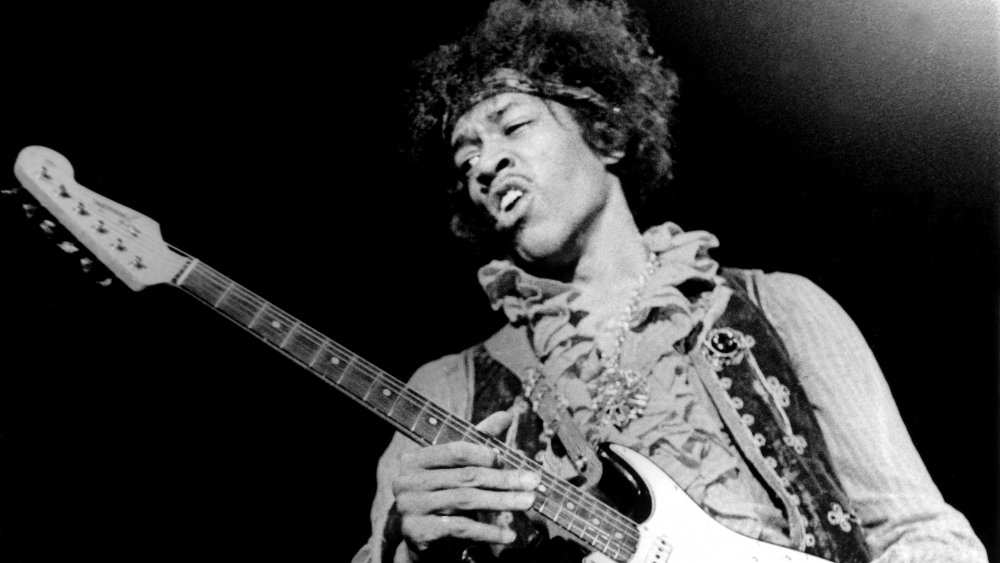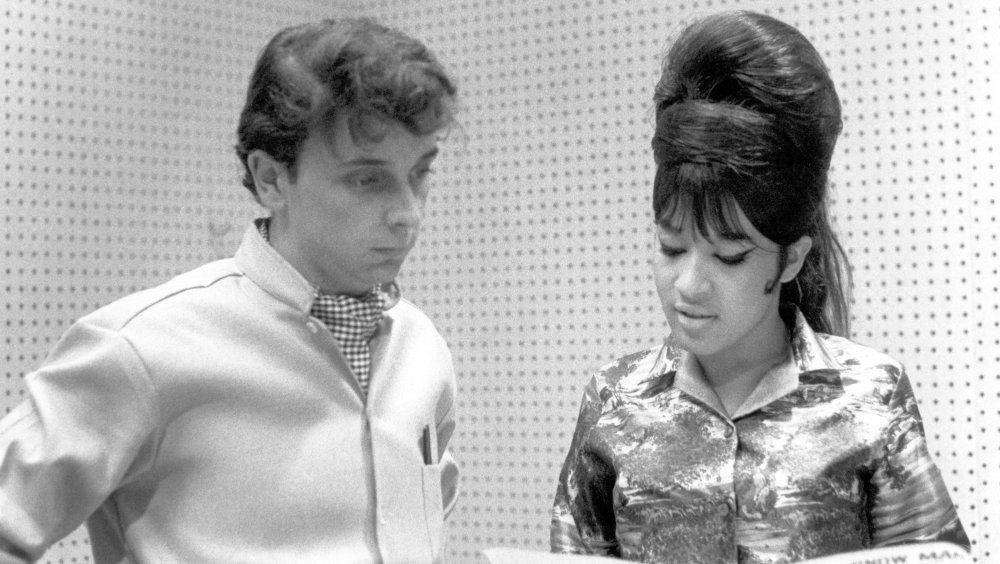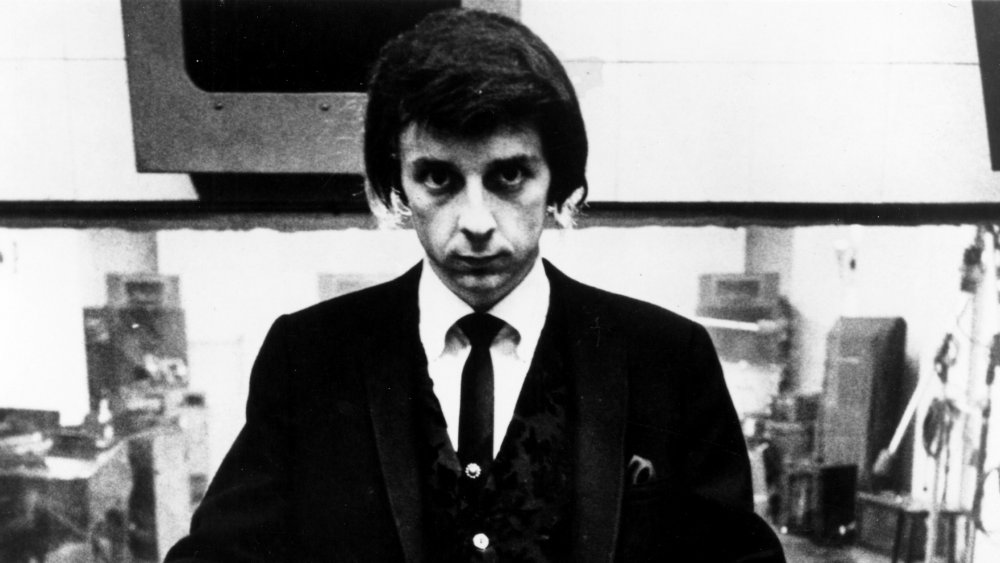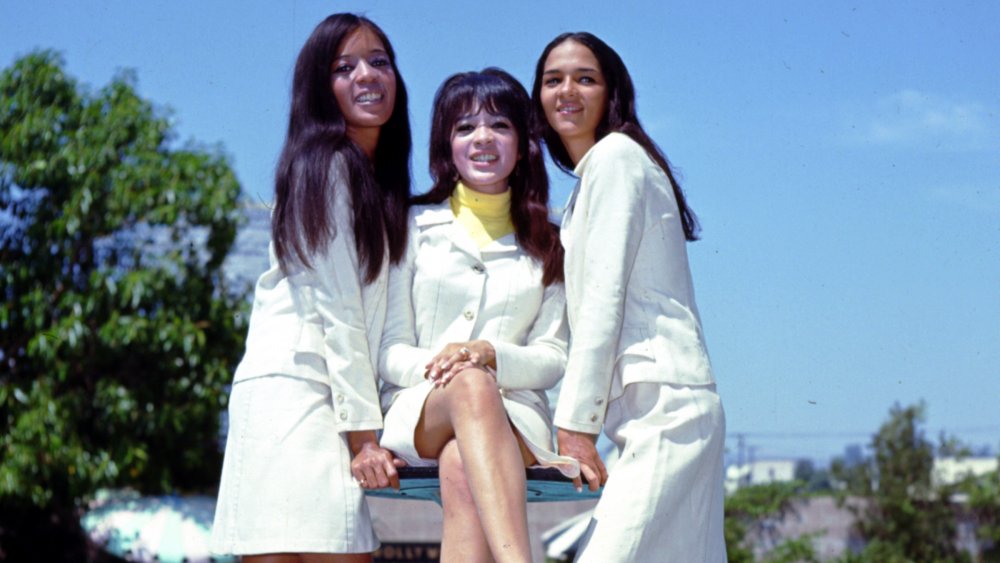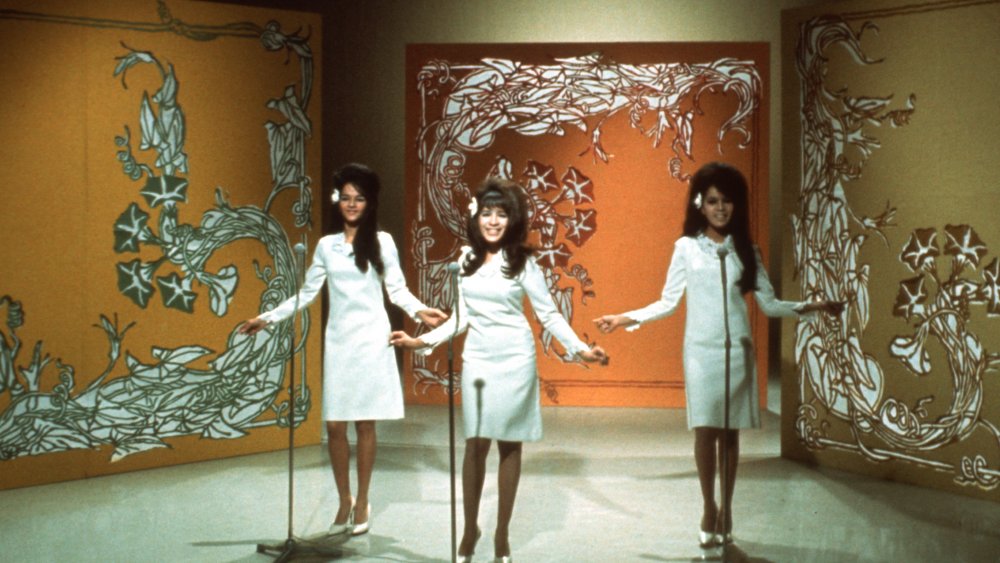The Tragic Real-Life Story Of Ronnie Spector
In the late 1950s, the all-girl pop group known as the Ronettes were just beginning to make a name for themselves. By the 1960s, the group had reached superstardom with hit songs like "Be My Baby," "The Best Part of Breaking Up," and "Walking in the Rain." Their sound and style appealed to the world, but something special set them apart as pioneers in a male-dominated industry.
The Ronettes may have been presented as a pop group, but, with a closer look, were as rock 'n' roll as it gets. It was Ronnie Spector's vocal choices, the way the group looked, and how they performed that pushed subtle boundaries and put them in a whole new genre. As NPR wrote, "The Ronettes' bad girl look, with piled hair and heavy eyeliner, [...] pushed back against these gendered expectations, blurring genre lines and signaling a certain kind of refusal to submit."
Frontwoman Ronnie Spector led the way during this pivotal change in music and was called the "original bad girl of rock 'n' roll." Throughout her life, Spector would experience many tragedies as well as rack up a list of achievements like no other. Her marriage to Phil Spector — the legendary music producer who is now in prison for killing actress Lana Clarkson in 2003 — led to her breaking point and left a book's worth of disturbing stories behind. Spector would deal with the remnants of her six-year marriage for years but would eventually reclaim her life with a memoir release, an induction into the Rock and Roll Hall of Fame, and returning to what she loved most: singing. Sadly, she died of cancer on January 12, 2022, reports CNN. She was 78.
Ronnie Spector never felt like she fit in as a child
Ronnie Spector (originally born Veronica Bennett) grew up as a unique person during a unique time: in Spanish Harlem in the 1940s and 1950s, as the Harlem Renaissance ushered in the civil rights movement. Spector's father was Irish-American and her mother was African American and Cherokee, per The Herald. In her memoir, Be My Baby: How I Survived Mascara, Miniskirts, and Madness, or My Life as a Fabulous Ronette, Spector spoke of how she never really fit in with other races as a child. "I still didn't feel like I fit in with any one group. The blacks never really accepted me as one of them. The white kids knew I wasn't white. And the Spanish kids didn't talk to me because I didn't speak Spanish."
Spector would spend time with her family, developing a close relationship with her sister, Estelle Bennett, cousin, Nedra Talley, and mother, Beatrice Bennett. She would gravitate towards music, which bonded her with her family, and her unique racial mix would help set her apart. As Biography writes, her "distinct voice, and striking beauty would later prove to be a boon for her music career." And music was booming at a place not far from where Spector's mother worked — a place called the Apollo Theatre, which was "strictly off-limits" when they were kids.
Ronnie Spector discovers her passion then forms the Ronettes
Ronnie Spector was inspired to pursue music after listening to Frankie Lymon, an African American singer from Harlem who was only a year older than Spector. She fell in love with his voice and would sing along to his records with her family. "It was the echo in that hallway that made me feel like, I can really sing," Spector told The Herald. "I'm like eight or nine years old and I'm singing Frankie Lymon songs and all my cousins are backing me up with all the doo wop stuff and that's my first memory of saying 'I can sing.'"
According to her memoir, Spector would eventually meet Lymon after her mom happened to run into him at the diner where she worked. Lymon was invited to Spector's 13th birthday party but never showed up. It crushed her. Only a few weeks later, Lymon would show up at Spector's front door, with alcohol on his breath, and gave off an impression that made Spector feel like she really knew who her teen idol truly was. While this experience hurt even more, she still loved the music he sang and focused on making her dreams into a reality as she, Estelle, and Nedra would form The Ronettes. The musical trio would eventually perform at the place her mother warned her about, The Apollo Theatre, as their career would rise in popularity.
Ronnie Spector was devastated when her friend Jimi Hendrix passed
Ronnie Spector, along with the Ronettes, befriended and toured in the mid-1960s with many artists like the Rolling Stones the Beatles, the Yardbirds, the Kinks, Eric Clapton, David Bowie, and John Lennon. One of Spector's most legendary and closest friends was Jimi Hendrix. In an interview with Rolling Stone, Spector spoke how she and Jimi would hang out at the recording studio, sing songs together, and hang out whenever they were able to.
Hendrix loved Spector's voice, commenting on it one time saying, "Boy, your voice sounds like a guitar." Hendrix was famous for his guitar-playing and could make his axe sound like no one else. He would eventually invite Spector over to his recording studio and have her sing along to one of the songs he was working on. Hendrix would do all he could to make excuses to see Spector, even leaving the tapes from their recording session in her car so she had to come back. "The good people die ... like Jimi Hendrix, I knew him really well then all of a sudden he's gone. Gone. It bothers me that a lot of the rock & roll people that I loved, that I hung out with, are gone," Spector said.
Ronnie Spector marries Phil Spector and loses her freedom
In the mid-1960s, as the Ronettes rose in popularity, they caught the attention of Phil Spector, who was a record producer known for his famous "wall of sound" technique which musicians at the time were raving about. Ronnie and Phil would soon become smitten with each other and would fall in love. Phil would take the Ronettes' career to new heights, producing such classics as "Be My Baby" and "Walking in the Rain," and would subsequently be the reason for their breakup.
On April 14, 1968, the two married and lived at Phil's Los Angeles mansion. Their marriage turned dark as Phil Spector's mental state changed due to his declining career, per Biography. Ronnie wrote in her memoir about how Phil would isolate her from everyone and everything she loved. He installed intercoms in every room so he knew where she was, made her drive with a life-size doll that looked just him (whenever she was allowed to leave), and threatened to have her killed if she left, among many other insane demands. Phil also made Ronnie give up what she loved most: singing. "For seven years, I didn't go anywhere," Spector said in a Rolling Stone interview. "I never saw a movie. I never did anything in California because everything was brought to me."
Phil Spector adopted twins without asking Ronnie Spector
After their wedding, Ronnie and Phil Spector both agreed to adopt a mixed-race boy and raise him together. However, as Phil got crazier, more bizarre things would occur, and many of them would happen without his wife's consent. One of the strangest things Phil did was adopt twins without ever having a conversation with Ronnie. "We were in the car and all of a sudden we pull up to the mansion and there's a fountain and there are these twins running around — these blond-haired, blue-eyed twins," she told People. "I'm saying, 'What's this?' He said, 'Merry Christmas!'"
"He never said, 'Ronnie, what do you think we should do? Should we adopt twins?' Nothing! Everything was a surprise, and no woman wants live children as a surprise," she said.
According to Biography and The New York Daily News, all three sons were also subject to abuse by Phil. Just like Ronnie, they were imprisoned and treated as less than human.
Ronnie Spector escapes
Ronnie Spector was getting worse as the years went on. She became more and more depressed and was driven to becoming an alcoholic. Her life was passing her by as she remained under her husband's control. What made things even worse, was that she wasn't able to express herself and enjoy her passion for singing. It wasn't until her mother, Beatrice, was able to finally get through to her and launch a plan for her to escape in 1972, that Ronnie was able to reclaim her life.
"She said, 'I'm your mother and I'm telling you, we gotta get out of here. Or you, my little girl, are going to be gone,'" Spector told People. Spector and her mother took three days to plan how she'd leave the mansion, according to an interview on SiriusXM.
"I would tell any woman, if you are in a bad relationship, you have to find someone — like my mother. If it's not your mother, your best friend. One person has to help you," she says.
Ronnie Spector is honored as she starts her solo career
After Ronnie Spector escaped from Phil Spector, she moved back home to New York. In 1974, the couple divorced and Spector was able to move on with her life. In 1976, Billy Joel had written a song called "Say Goodbye to Hollywood," which was heavily inspired by The Ronettes' song "Be My Baby." Steve Van Zandt of Bruce Springsteen's E Street band had gotten in contact with Spector and recommended she cover the song, according to Rolling Stone. These would be the first steps Spector would take towards taking back her life and doing what she'd loved since she was a little girl.
"I didn't do any shows for seven years and was so isolated," Spector said. "So when I came back with 'Say Goodbye to Hollywood,' I was so shocked that anyone cared. When I went to play at the Stone Pony in Asbury Park, New Jersey in the Seventies, there's Bruce up onstage and Billy Joel sitting next to me. These people idolized me and I was saying, 'Me?'"
While Spector tried to get her solo career off the ground, she still had many personal issues to deal with. Springsteen originally planned to write an entire album with Spector singing, but she couldn't commit at the time. Spector may not have been able to record her solo album just yet, but she did take the first steps to return to her passion and saw how much her work meant to others.
Phil Spector held The Ronettes' royalties hostage
For nearly 15 years, Ronnie Spector, along with the Ronettes, waged a court battle with Phil Spector over the royalties to their music, per Billboard. Starting in the 1980s, the women took Phil to court and said their music was being used in ways not authorized by their record contract. "Be My Baby" was used in the opening credits of the movie Dirty Dancing, and they weren't paid.
After a trial was held in 1998, in 2000, a judge ordered Phil Spector to pay $2.6 million in royalties and interest after their songs had been used in movies and advertising. In 2002, the ruling was thrown out by New York's highest court. The judges said that the contract didn't mention "synchronization rights," which were secondary rights to use their music. Under New York's state contract law, it was ruled that the Ronettes didn't control those rights unless it was stated in the contract. According to Dispatch, after lawyers' fees, each member of the Ronettes took home about $100,000.
Ronnie Spector loses her sister and bandmate Estelle Bennett
On February 11, 2009, Ronnie Spector's sister and bandmate, Estelle Bennett, passed away. This was another tragic moment in Spector's life and the death of her sister was devastating. "Estelle was Ronnie's sidekick in the Ronettes," Spector's current husband, Jonathan Greenfield, told Billboard. "She was very much into fashion and worked with Ronnie on the whole look and style of the Ronettes." According to Dispatch, Bennett, the eldest of the group, worked at Macy's and went to the Fashion Institute of Technology. During her healthy days, she was known as gentle, quiet, and intelligent.
After the Ronettes broke up, Bennett's life drifted into turmoil. She would wander the streets, telling people she and the Ronettes would perform at a jazz club. She eventually dealt with anorexia, schizophrenia, and was sometimes homeless. "Estelle had such an extraordinary life," Nedra Talley-Ross told Dispatch. "To have the fame, and all that she had at an early age, and for it all to come to an end abruptly. Not everybody can let that go and then go on with life."
Ronnie Spector overcame an addiction to alcohol
During her marriage to Phil, Ronnie Spector's mental state declined, and she often turned to alcohol to cope. Spector had spent her whole life trying to avoid getting hooked on drugs or becoming an alcoholic. In her memoir, Spector wrote about how her childhood idol Frankie Lymon had shattered her expectations and broke her heart after arriving at her house with alcohol on his breath. Years later, Lymon would pass away at the age of 25 after a heroin overdose. Spector's painful experiences with alcohol went back even further to the days when her father would come home drunk. Spector writes, when she was little, her father had struggled to become a professional jazz musician, so he would drink to deal with it and eventually became an alcoholic.
During her days with Phil Spector, one of the things Ronnie loved most about alcohol was that it made her sleep, and when she slept, she was away from her imprisonment. Eventually, she would pry herself from the clutches of alcoholism and would focus on her music. "It started in the Sixties with my ex," Spector told Rolling Stone. "Later, when I moved home to New York from L.A., all I thought about was getting my career back on track. I said, 'That's it — no more drinking,' and I haven't had a drink in maybe 33 years. My greatest accomplishment at this point is just being alive."
Amy Winehouse made Ronnie Spector realize she mattered
Just as Frankie Lymon was an inspiration for her, Ronnie Spector was an inspiration for Amy Winehouse. And it was Winehouse who made Spector realize how important her music was. "Amy Winehouse was so great for me, because she made me feel like what I did mattered," Spector said in an interview with Rolling Stone. "The hair, the eye makeup. I recorded 'Back to Black' three years before she died." Spector admired Winehouse from afar, never formally meeting the singer but learning about her through the media. "I'd read where she'd say, 'I loved all-girl groups but my specialty was the Ronettes and Ronnie Spector with the way she wore her hair.' I got messages through her interviews."
Winehouse would pass away in 2011 from alcohol poisoning, a substance that ruined Spector's relationships and almost destroyed her life; however, she would eventually become close to Winehouse's mother. She would start coming to Spector's shows and the two would bond over music, life, and Amy Winehouse, who brought them together. "Her mother comes to every show I do in the U.K. She wrote a book about Amy and gave me a copy. She wrote an inscription that was so sweet and personal about how I was her daughter's inspiration. It just made me feel so great. And it makes me continue to want to sing, 'cause what I did back then mattered: the hair, the makeup," Ronnie Spector reflected.
Ronnie Spector's legacy
According to Biography, in the 1980s, Ronnie Spector met Jonathan Greenfield, whom she married. Greenfield was her manager and they lived in Connecticut with two children. Spector returned to the charts in 1986 when she sang on Eddie Money's hit "Take Me Home Tonight," which interpolated the chorus of "Be My Baby." In 2007, Spector, along with her sister and cousin, were inducted into the Rock and Roll Hall of Fame by Keith Richards. Spector was honored, and it was another experience that helped her realize how much she mattered. "I feel grown up when I'm singing now. I don't feel like a little girl," Spector told The Herald.
In 2016, Spector released English Heart, where she covered songs from the Beatles, the Zombies, the Bee Gees, and others. In September 2020, it was announced that Zendaya will play Ronnie Spector in an upcoming movie about her life, Vanity Fair reports. The A24 biopic will be based on Spector's memoir, Be My Baby, and will depict her life from when she was a child in Spanish Harlem to her rise to fame in the Ronettes.
Spector had lived a life that will be fascinating to watch on the silver screen. In an interview with Rolling Stone, when asked if she'd retire, Ronnie Spector said: "The way people whistle at me? At this age? I love it. I will never retire from rock & roll. Rock & roll will have to retire me." As CNN notes, she recorded music well into her 70s, leaving quite the legacy. She died of cancer on January 12, 2022. She was 78.
